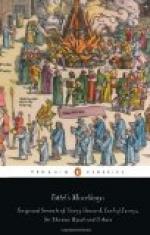|
This section contains 9,524 words (approx. 32 pages at 300 words per page) |

|
SOURCE: Hardison, O. B. “Tudor Humanism and Surrey's Translation of the Aeneid.” Studies in Philology 83, no. 3 (summer 1986): 237-60.
In the following essay, Hardison credits Surrey with the invention of English blank verse.
One of the more interesting facts about English blank verse is that it was invented. The evidence suggests that it was the result of a self-conscious effort by Henry Howard, Earl of Surrey, around 1540 to create a vernacular English form equivalent to the dactylic hexameter of classical epic and parallel to unrhymed continental forms such as Italian versi sciolti.
The background of this effort has been illuminated by the excellent studies of such scholars as Jones, Mason, Hagar, and Richardson.1 It is part of what can be called the esoteric phase of English civic humanism, in contrast to the exoteric phase. The exoteric humanists saw themselves as part of an international movement bent on restoring universal...
|
This section contains 9,524 words (approx. 32 pages at 300 words per page) |

|


